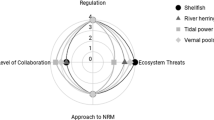
Overview
- This book is open access, which means that you have free and unlimited access
- Provides an interdisciplinary understanding of peatland destruction and insights on its environmental governance
- Presents combined studies of established fieldwork methodologies and contemporary technology
- Explores the potential of long-distance research with rural communities through online facilitation
Part of the book series: Global Environmental Studies (GENVST)
Buy print copy
Tax calculation will be finalised at checkout
About this book
This open access book is one in a series of four volumes introducing peatland conservation and restoration in Indonesia. It focuses on local governance, in particular on regional and local perspectives in Riau, the most peat-destructed province of Indonesia. The book fills a vital gap in the existing literature that overlooks social science and humanities perspectives. Written by authors from different disciplines and backgrounds (including scholars and NGO activists), the approaches to the topic are various and unique, including analysis of GPS logs, social media, geospatial assessments, online interviews (conducted due to the Covid-19 pandemic), and more conventional questionnaires and surveys of community members. The chapters cover an interdisciplinary understanding of peatland destruction and broadly offer insights into environmental governance. While presenting combined studies of established fieldwork methodologies and contemporary technology such as drones and geospatial information, the book also explores the potential of long-distance research with rural communities through online facilitation, which was brought about by Covid-19, but that may have longterm implications.
Readers will gain a comprehensive understanding of the complexities surrounding peatland conservation and restoration and recognize the significance of locally inclusive approaches that use contemporary but accessible technologies to sustainably govern the globally important resource of peatland. That approach would be useful for other environmentally fragile but important regions and give some ideas to achieve the United Nations’ SDGs for 1)No Poverty, 5)Gender Equality, 13)Climate Action, 15)Life of Land.
Similar content being viewed by others
Keywords
Table of contents (13 chapters)
-
Front Matter
-
Back Matter
Editors and Affiliations
About the editors
Takamasa Osawa, Ph.D., is a lecturer at the Institute of Liberal Arts and Science, Kanazawa University, and was a full-time researcher of the Tropical Peatland Society Project at the Research Institute for Humanity and Nature between 2017 and 2022 in Japan. He received an MSc from the London School of Economics and a Ph.D. from the University of Edinburgh. He is a social anthropologist with a special interest in the relations between indigenous communities and the nation-state, the impacts of development and environmental policies on local communities, and inter-ethnic and inter-religious communications. He has conducted fieldwork with several local communities in Riau province, Indonesia, intermittently since 2006. The result is presented in At the Edge of Mangrove Forest: The Suku Asli and the Quest for Indigeneity, Ethnicity and Development (2022).
Wahyu Prasetyawan, Ph.D., is an associate professor at Syarif Hidayatullah Islamic State University (UIN) in Jakarta, Indonesia. He has been a visiting professor since 2007 at GRIPS (National Graduate Institute for Policy Studies) in Tokyo, Japan. He received an MA degree in development studies from Leeds University, UK, and received Ph.D. in Political Economy from Kyoto University. He carries out research on the political economy of natural resources, economic growth, democratization, and identity politics. He has published journal articles in leading academic journals such as Indonesia (by Cornell University), Southeast Asian Studies (Kyoto University), Sojourn (by ISEAS), and Journal of Southeast Asian Affairs (by Hamburg University). His book includes Networked: Business and Politics in Decentralizing Indonesia 1998-2004 (2018) (36th Ohira Masayoshi Prize).
Akhwan Binawan is a social activist in the field of environment and socio-culture in Indonesia. After completing his studies at Riau University, he chose to be active in social organizations, and now he works at an environmental NGO, Perkumpulan Ara Sati Hakiki. he is concerned with the issue of indigenous peoples and environmental conservation. Since 2005, he has been active in mapping indigenous territories and village boundaries, the results of which are used by the community for the planning of natural resource management in their areas. He is also actively advocating for the community’s right to land in Riau province, Indonesia.
Bibliographic Information
Book Title: Local Governance of Peatland Restoration in Riau, Indonesia
Book Subtitle: A Transdisciplinary Analysis
Editors: Masaaki Okamoto, Takamasa Osawa, Wahyu Prasetyawan, Akhwan Binawan
Series Title: Global Environmental Studies
DOI: https://doi.org/10.1007/978-981-99-0902-5
Publisher: Springer Singapore
eBook Packages: Earth and Environmental Science, Earth and Environmental Science (R0)
Copyright Information: The Editor(s) (if applicable) and The Author(s) 2023
Hardcover ISBN: 978-981-99-0901-8Published: 31 March 2023
Softcover ISBN: 978-981-99-0904-9Published: 31 March 2023
eBook ISBN: 978-981-99-0902-5Published: 30 March 2023
Series ISSN: 2192-6336
Series E-ISSN: 2192-6344
Edition Number: 1
Number of Pages: XII, 333
Number of Illustrations: 1 b/w illustrations
Topics: Conservation Biology/Ecology, Environmental Management, Sustainable Development, Ecology, Environmental Communication


